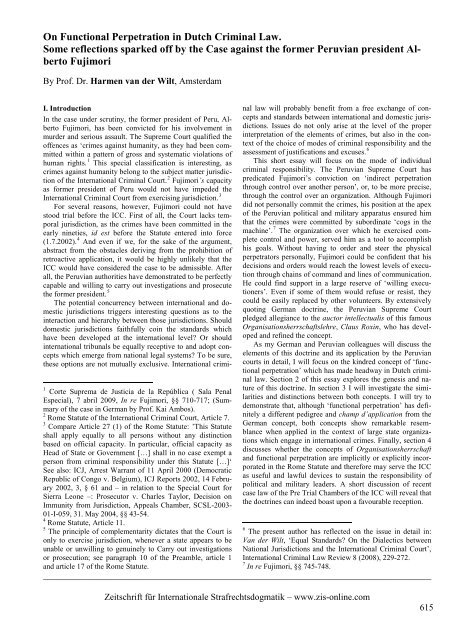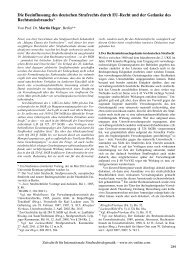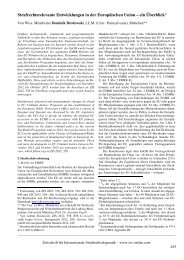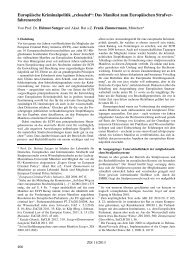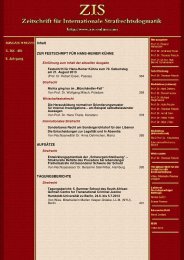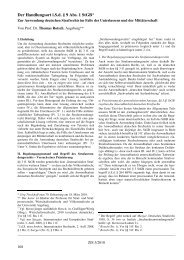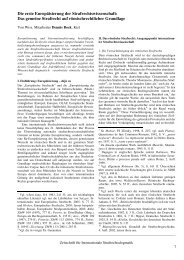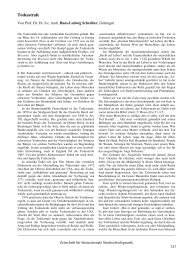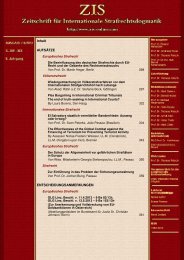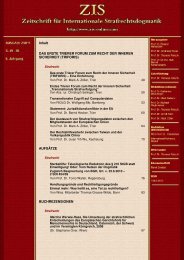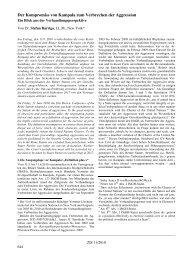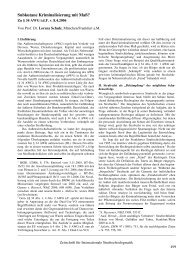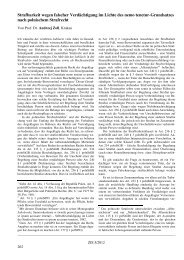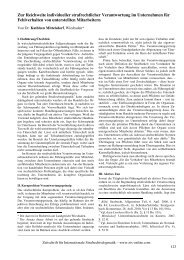Inhalt AUFSÄTZE ANHANG - ZIS
Inhalt AUFSÄTZE ANHANG - ZIS
Inhalt AUFSÄTZE ANHANG - ZIS
- No tags were found...
You also want an ePaper? Increase the reach of your titles
YUMPU automatically turns print PDFs into web optimized ePapers that Google loves.
On Functional Perpetration in Dutch Criminal Law.Some reflections sparked off by the Case against the former Peruvian president AlbertoFujimoriBy Prof. Dr. Harmen van der Wilt, AmsterdamI. IntroductionIn the case under scrutiny, the former president of Peru, AlbertoFujimori, has been convicted for his involvement inmurder and serious assault. The Supreme Court qualified theoffences as ‘crimes against humanity, as they had been committedwithin a pattern of gross and systematic violations ofhuman rights. 1 This special classification is interesting, ascrimes against humanity belong to the subject matter jurisdictionof the International Criminal Court. 2 Fujimori’s capacityas former president of Peru would not have impeded theInternational Criminal Court from exercising jurisdiction. 3For several reasons, however, Fujimori could not havestood trial before the ICC. First of all, the Court lacks temporaljurisdiction, as the crimes have been committed in theearly nineties, id est before the Statute entered into force(1.7.2002). 4 And even if we, for the sake of the argument,abstract from the obstacles deriving from the prohibition ofretroactive application, it would be highly unlikely that theICC would have considered the case to be admissible. Afterall, the Peruvian authorities have demonstrated to be perfectlycapable and willing to carry out investigations and prosecutethe former president. 5The potential concurrency between international and domesticjurisdictions triggers interesting questions as to theinteraction and hierarchy between those jurisdictions. Shoulddomestic jurisdictions faithfully coin the standards whichhave been developed at the international level? Or shouldinternational tribunals be equally receptive to and adopt conceptswhich emerge from national legal systems? To be sure,these options are not mutually exclusive. International crimi-1 Corte Suprema de Justicia de la República ( Sala PenalEspecial), 7 abril 2009, In re Fujimori, §§ 710-717; (Summaryof the case in German by Prof. Kai Ambos).2 Rome Statute of the International Criminal Court, Article 7.3 Compare Article 27 (1) of the Rome Statute: ’This Statuteshall apply equally to all persons without any distinctionbased on official capacity. In particular, official capacity asHead of State or Government […] shall in no case exempt aperson from criminal responsibility under this Statute […]‘See also: ICJ, Arrest Warrant of 11 April 2000 (DemocraticRepublic of Congo v. Belgium), ICJ Reports 2002, 14 February2002, 3, § 61 and – in relation to the Special Court forSierra Leone –: Prosecutor v. Charles Taylor, Decision onImmunity from Jurisdiction, Appeals Chamber, SCSL-2003-01-I-059, 31. May 2004, §§ 43-54.4 Rome Statute, Article 11.5 The principle of complementarity dictates that the Court isonly to exercise jurisdiction, whenever a state appears to beunable or unwilling to genuinely to Carry out investigationsor prosecution; see paragraph 10 of the Preamble, article 1and article 17 of the Rome Statute.nal law will probably benefit from a free exchange of conceptsand standards between international and domestic jurisdictions.Issues do not only arise at the level of the properinterpretation of the elements of crimes, but also in the contextof the choice of modes of criminal responsibility and theassessment of justifications and excuses. 6This short essay will focus on the mode of individualcriminal responsibility. The Peruvian Supreme Court haspredicated Fujimori’s conviction on ‘indirect perpetrationthrough control over another person’, or, to be more precise,through the control over an organization. Although Fujimoridid not personally commit the crimes, his position at the apexof the Peruvian political and military apparatus ensured himthat the crimes were committed by subordinate ‘cogs in themachine’. 7 The organization over which he exercised completecontrol and power, served him as a tool to accomplishhis goals. Without having to order and steer the physicalperpetrators personally, Fujimori could be confident that hisdecisions and orders would reach the lowest levels of executionthrough chains of command and lines of communication.He could find support in a large reserve of ‘willing executioners’.Even if some of them would refuse or resist, theycould be easily replaced by other volunteers. By extensivelyquoting German doctrine, the Peruvian Supreme Courtpledged allegiance to the auctor intellectualis of this famousOrganisationsherrschaftslehre, Claus Roxin, who has developedand refined the concept.As my German and Peruvian colleagues will discuss theelements of this doctrine and its application by the Peruviancourts in detail, I will focus on the kindred concept of ‘functionalperpetration’ which has made headway in Dutch criminallaw. Section 2 of this essay explores the genesis and natureof this doctrine. In section 3 I will investigate the similaritiesand distinctions between both concepts. I will try todemonstrate that, although ‘functional perpetration’ has definitelya different pedigree and champ d’application from theGerman concept, both concepts show remarkable resemblancewhen applied in the context of large state organizationswhich engage in international crimes. Finally, section 4discusses whether the concepts of Organisationsherrschaftand functional perpetration are implicitly or explicitly incorporatedin the Rome Statute and therefore may serve the ICCas useful and lawful devices to sustain the responsibility ofpolitical and military leaders. A short discussion of recentcase law of the Pre Trial Chambers of the ICC will reveal thatthe doctrines can indeed boast upon a favourable reception.6 The present author has reflected on the issue in detail in:Van der Wilt, ‘Equal Standards? On the Dialectics betweenNational Jurisdictions and the International Criminal Court’,International Criminal Law Review 8 (2008), 229-272.7 In re Fujimori, §§ 745-748._____________________________________________________________________________________Zeitschrift für Internationale Strafrechtsdogmatik – www.zis-online.com615


